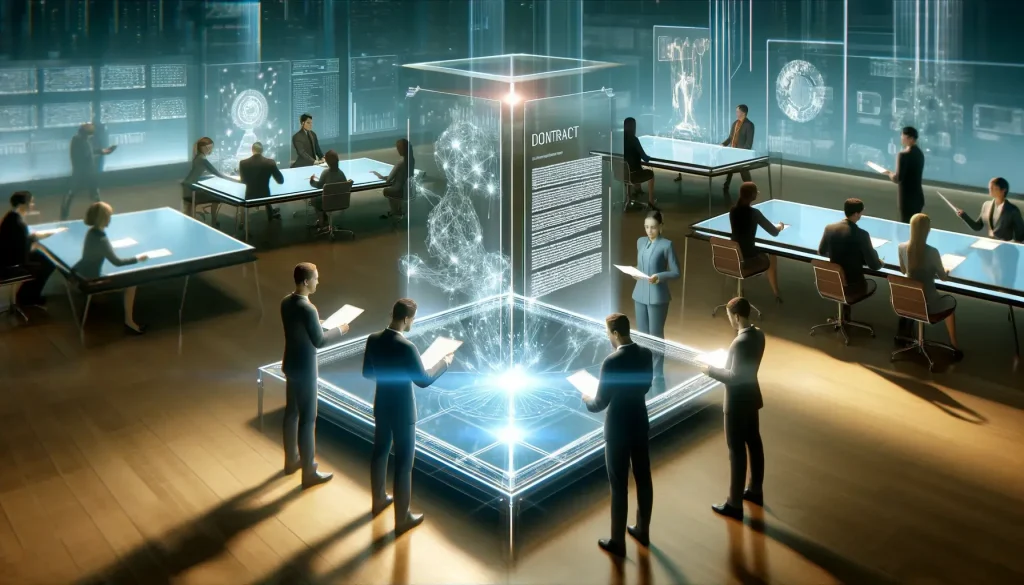
The Invisible Architects: How Smart Contracts Power the Future of Decentralized Infrastructure(DePIN)
In the evolving landscape of decentralized technologies, smart contracts stand as the invisible architects that power complex systems without human intervention. Their ability to autonomously enforce agreements has far-reaching implications, especially in Decentralized Physical Infrastructure Networks (DePIN). This article dives deep into what smart contracts are, how they operate, and why they are crucial to the future of DePIN.
What Are Smart Contracts?
Smart contracts are self-executing contracts with the terms of the agreement directly written into code. They remove the need for intermediaries by automating the enforcement of contract conditions, making them not just efficient but also incredibly reliable.
However, smart contracts are more than just digital agreements. They signify a major change in how trust and enforcement are managed in the digital world. Traditional contracts require parties to trust that the terms will be upheld, often necessitating legal oversight. In contrast, smart contracts operate on blockchain technology, ensuring that once they are deployed, they are immutable and transparent. This means that no single party can alter the contract’s terms, and all parties have visibility into the contract’s operations.
The implications of this are profound. In a world where trust can be hard to come by, smart contracts offer a way to guarantee that agreements are honored, no matter the circumstances.
How Do Smart Contracts Work?
Autonomous Execution and Validation
Smart contracts work on a simple yet powerful “if-then” principle.
When the predefined conditions are met, the smart contract automatically executes the relevant actions. For example, in a financial agreement, the contract might transfer funds from one party to another when a specific date is reached or when certain criteria are fulfilled.
Before execution, the network’s nodes validate the conditions. This decentralized validation ensures that no single entity can manipulate the process, providing an additional layer of security.
Immutability and Transparency
Once executed, the outcome of the smart contract is permanently recorded on the blockchain. This creates an unalterable record that can be audited by anyone, ensuring full transparency.
The automation and security provided by smart contracts have made them a cornerstone of the blockchain ecosystem, facilitating everything from simple transactions to complex multi-party agreements.
How Smart Contracts Revolutionize DePIN
DePIN represents a new frontier where physical infrastructure is managed and operated in a decentralized manner. This could include anything from decentralized wireless networks to energy grids and sensor networks.
Automating Infrastructure Operations
In DePIN, physical assets like sensors, storage units, or energy nodes must interact autonomously. Smart contracts enable these interactions by automating tasks such as resource allocation, data sharing, and even maintenance operations. For instance, a smart contract can automatically reassign network resources when a node fails, ensuring uninterrupted service.
Enabling Trustless Interactions
DePIN ecosystems often involve multiple stakeholders—ranging from asset owners to service providers and end users. Smart contracts eliminate the need for these parties to trust one another by ensuring that all transactions are automatically enforced according to the agreed terms. This is particularly crucial in environments where parties may have never interacted before.
Streamlining Payments and Incentives
One of the most powerful applications of smart contracts in DePIN is in managing payments and incentives. For example, a storage network might use smart contracts to charge users based on the amount of data stored and the duration. Simultaneously, the network can reward those who contribute storage space, all without any manual intervention.
Decentralizing Governance
In a traditional infrastructure network, decisions are often made by a centralized authority. In DePIN, smart contracts can facilitate decentralized governance by enabling stakeholders to propose, vote on, and implement changes to the network. This democratic approach not only empowers users but also enhances the network’s resilience by distributing decision-making power.
Creating Secure, Autonomous Markets
Imagine a decentralized energy grid where consumers can buy energy directly from producers without a middleman. Smart contracts can automate these transactions, ensuring that energy is delivered and payments are made without any delays or disputes. This creates a more efficient market, free from the inefficiencies and overheads of traditional systems.

The Future of Smart Contracts in DePIN: Opportunities and Challenges
As DePIN continues to evolve, smart contracts will likely play an even more significant role. Their ability to automate complex processes, ensure trustless interactions, and manage decentralized infrastructure makes them indispensable in this new paradigm.
However, the path forward is not without challenges. The complexity of smart contracts means that they must be carefully coded to avoid bugs that could lead to unintended consequences. Additionally, the scalability of smart contracts on certain blockchains may become a bottleneck as DePIN networks grow.
Despite these challenges, the potential of smart contracts in DePIN is immense. As technology advances and more robust frameworks are developed, we can expect to see smart contracts driving innovation in decentralized infrastructure, making it more efficient, secure, and accessible to all.
Conclusión
Smart contracts are more than just a technological innovation—they are a fundamental building block for the future of decentralized infrastructure. By automating complex interactions, ensuring trustless transactions, and providing a foundation for decentralized governance, they are helping to unlock the full potential of DePIN. As we look to the future, the continued evolution of smart contracts will undoubtedly play a critical role in shaping the decentralized networks that will power our world.


